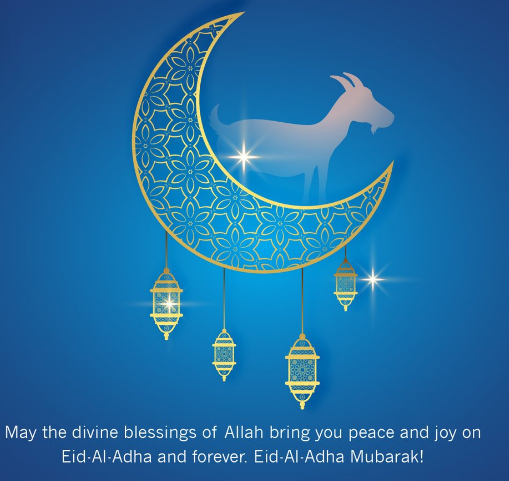Wishing Muslims, a Joyous Eid-ul-Adha

As the Islamic world prepares to observe Eid-ul-Adha, it is an opportune time to extend heartfelt wishes to our Muslim brothers and sisters around the globe. Eid-ul-Adha, also known as the “Festival of Sacrifice,” holds immense significance in Islam and commemorates a pivotal moment of faith and devotion. This occasion is not only a time for celebration but also a reminder of the values of sacrifice, charity, and unity that transcend religious boundaries. Let us delve into the essence of Eid-ul-Adha and understand why it should be cherished and celebrated.

Eid-ul-Adha, the second of the two major Islamic festivals, marks the culmination of Hajj, the annual pilgrimage to the holy city of Mecca. It honours the willingness of Prophet Ibrahim (Abraham) to sacrifice his son, Ismail (Ishmael), as an act of obedience to God. Just as Prophet Ibrahim was about to make the sacrifice, Allah intervened and provided a ram in Ismail’s place. This act of divine intervention highlights the significance of surrendering to God’s will and trusting in His mercy.

A Celebration of Faith and Unity:
Eid-ul-Adha is a celebration of unwavering faith, devotion, and trust in Allah. It serves as a reminder to Muslims and non-Muslims alike of the importance of submitting to a higher power and having faith in times of difficulty. The story of Prophet Ibrahim exemplifies the essence of sacrifice, as he was willing to give up what was most dear to him for the sake of Allah. This narrative inspires Muslims to emulate his commitment to God and reinforces the values of selflessness and obedience.
The Symbolism of Sacrifice:
The focal point of Eid-ul-Adha is the sacrifice of an animal, usually a sheep, goat, cow, or camel, in commemoration of Prophet Ibrahim’s act. This sacrifice represents an act of devotion, symbolizing Muslims’ willingness to give up their own desires and material possessions for the sake of Allah. It is important to note that the significance lies not in the mere act of sacrifice but in the sincere intention behind it. The meat from the sacrifice is divided into three equal parts: one for the family, one for relatives and friends, and one for the less fortunate. This practice encourages generosity and compassion, fostering a sense of communal harmony and social responsibility.

The Spirit of Eid-ul-Adha:
Eid-ul-Adha serves as a unifying force, bringing together Muslims from all walks of life and promoting a sense of community and togetherness. Families and friends come together to perform communal prayers, share festive meals, exchange gifts, and engage in acts of charity. This festive occasion reinforces the bonds of love, strengthens relationships, and encourages the spirit of forgiveness and reconciliation. It also provides an opportunity for Muslims to express gratitude for their blessings and extend a helping hand to those in need.
Why Eid-ul-Adha Should Be Celebrated?
Eid-ul-Adha carries immense significance beyond religious observance. Its universal values of sacrifice, faith, unity, and charity resonate with people of diverse backgrounds. By celebrating Eid-ul-Adha, we acknowledge and appreciate the rich tapestry of human cultures and traditions, fostering mutual respect and understanding. It is an occasion that encourages us to reflect on our own acts of sacrifice and service to others, thereby promoting empathy and compassion.
As Muslims around the world prepare to celebrate Eid-ul-Adha, let us join them in wishing a joyous and meaningful festival. This auspicious occasion serves as a reminder of the importance of sacrifice, faith, and unity in our lives. Eid-ul-Adha encapsulates the essence of devotion, selflessness, and gratitude, serving as a beacon of inspiration for people of all faiths. By recognizing and honouring the values it embodies, we can cultivate a spirit of harmony, compassion, and communal well-being in our global society. As we extend our warm wishes to our Muslim friends and neighbours, let us also embrace the teachings of Eid-ul-Adha and strive to make a positive impact in our own lives and the lives of others. May this festival of sacrifice and faith bring joy, peace, and blessings to all. Eid Mubarak!







